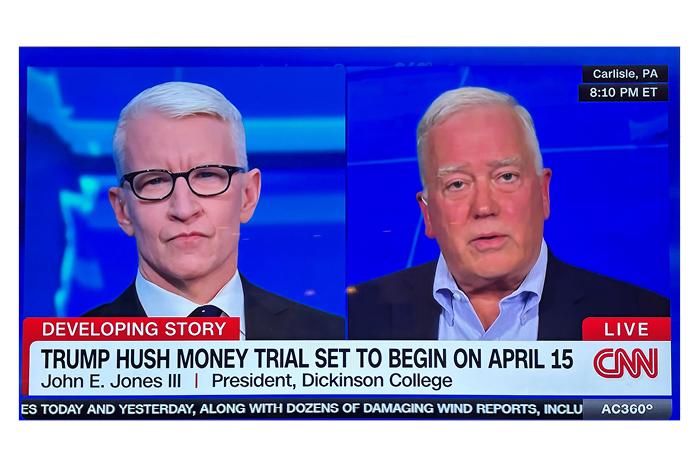President Jones Appears on CNN to Discuss Trump Cases

Dickinson President John E. Jones III '77, P'11 appears on CNN's Anderson Cooper 360.
President Jones shared his legal expertise as a former federal judge, commenting on the court cases involving former President Donald Trump
by Craig Layne
Dickinson President John E. Jones III ’77, P’11 appeared as a guest on the April 3 and April 5, 2024, broadcasts of CNN’s highest-rated primetime program, Anderson Cooper 360. Jones joined Cooper and CNN legal analysts Elliot Williams, Karen Friedman Agnifilo and Elie Honig to discuss several developments in the court cases involving former President Donald Trump.
During the April 3 appearance, Jones, who resigned from his lifetime appointment as chief judge for the U.S. Middle District Court of Pennsylvania in 2021 to lead his Alma Mater, first shared insight into the Presidential Records Act. The statute is at the center of a dispute between prosecutors and the judge overseeing the Trump classified documents case in Florida over whether the former president could claim the documents were “personal” and therefore not subject to the law.
“The absurdity of that, in my view, is that these are classified documents that are in play. They couldn’t possibly be personal,” Jones told Cooper. “The Presidential Records Act has a very narrow band of exclusions for things like diaries or cards or newspaper clippings.”
Williams, Agnifilo and Jones also discussed threats against judges, prosecutors and courtroom staff involved in the legal proceedings surrounding Trump. New York Judge Juan Merchan, who is overseeing the Trump hush money case in Manhattan, recently expanded a gag order after the former president posted about Merchan’s daughter on social media.
Jones served on the federal Committee on Judicial Security and has written about his courthouse security concerns.
“It’s not a question of the First Amendment. It’s a situation where it’s injurious to the administration of justice,” Jones explained. “We’re talking about judges’ families. We’re talking about prosecutors, prosecutors’ families, and what I fear greatly is we’re going to get somebody killed.”
During the April 5 appearance, Jones and Honig discussed Merchan’s decision not to recuse himself from the case, despite Trump’s attorneys accusing the judge of bias and conflict of interest, citing his past political donations and his daughter’s work with a firm whose clients have included prominent Democrats.
“The judge has to make a determination, can his impartiality be reasonably questioned in this case,” Jones told Cooper. “The risk, of course, is that he presides and creates an appellate issue, and the case ends up being reversed, based on the fact that an appellate court believes that Judge Merchan should’ve recused.”
National and international media outlets regularly ask Jones to help them analyze and understand legal concepts and decisions. He also frequently provides media commentary on higher education from his unique perspective as a college president. Jones and the college’s many faculty experts’ commitment to media work raise Dickinson’s profile as a source of thoughtful insight into current events.
TAKE THE NEXT STEPS
Published April 4, 2024